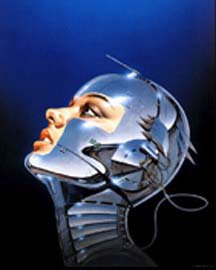
The great discovery of the postmodern era — indeed, the one that
defines postmodernity — has been the discovery of this other function of
language. It is the discovery that language does not merely represent
reality, but constitutes it. Our social orders, for example—the ones we
identify with, such as nation-states, ethnic groups, races, tribes —
could not exist without their words and visual systems. Our personal
identities would be hard to locate without the network of symbols
within which we are defined and the internal monologue with which
we continually remind ourselves who we think we are.
This discovery can be terribly frightening, but it is ultimately
liberating. It is liberating because people begin to use their symbolic
tools instead of being used by them, begin to have their identities
without being had by them. We are no longer hopelessly in the grip of
what William Blake aptly called "mind-forged manacles."
So identities continue to exist in the post-identity society, just as
industries and nations do — but in a different context.
It would be nice to be able to say, in these closing pages, that we
are making an evolutionary transition beyond the self, but that isn't
quite the case—not yet, anyway. What we are doing is catching a
glimpse of the self, recognizing it as a fiction, yet continuing to have
selves, identities, public personas, internal "I" narratives, and, yes,
egos. You will note that I have switched from the singular to the
plural, because that is what we all do as we become multilocality,
multicommunity, flexible, changeable beings. We move in and out of
different symbolic universes, defining ourselves and experiencing
ourselves differently as we do.

A postmodern person is being invented, but not out of any clear
design, nor in one place, nor by a single creative genius. The modern
self was not invented by a single individual either—not even Descartes
in his Bavarian bungalow.
The postmodern person is in part the product
of other inventions—such as the personal computer—that were not
conceived as agents of psychological change. He is in part the product
of research in fields such as cognitive science that give us a new
understanding of our own thought processes. She is in part the result of
improvised, often difficult adjustments to new conditions, when she
finds it no longer possible to be as she was.
The postmodern person is by no means a finished product; we are
evolutionary work in progress. We all are being required by the
changes in the world around us to become more open systems—taking
in new information, making new connections, moving our boundaries,
and even reexamining our ideas of what a human being is. As we do,
we become in some ways less than the modern self—less permanent,
less centered, less separate—and in some ways much more: Each of us
is more than a self, and also more than a postmodern progression of
multiple selves; each of us is also a marvelously complex, highly
evolved, and somewhat confused apparatus through which the
universe becomes aware of itself, admires itself, and tries to figure
out what it is.
